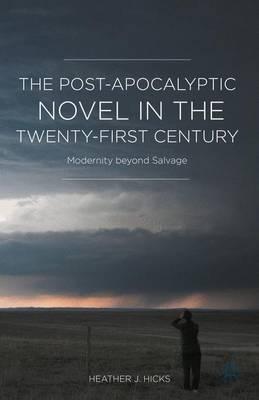Full Product Details
Author: H. Hicks
Publisher: Palgrave Macmillan
Imprint: Palgrave Macmillan
Edition: 1st ed. 2016
Dimensions:
Width: 14.00cm
, Height: 1.40cm
, Length: 21.60cm
Weight: 3.796kg
ISBN: 9781137553669
ISBN 10: 1137553669
Pages: 208
Publication Date: 16 January 2016
Audience:
Professional and scholarly
,
Professional & Vocational
Format: Hardback
Publisher's Status: Active
Availability: Manufactured on demand

We will order this item for you from a manufactured on demand supplier.
Reviews
When the world ends in post-apocalyptic fictions, what is it, exactly, that ends? Maybe modernity, clearing the way for a return to the premodern; or maybe postmodernity, freeing the world to move 'forward into the past' of a renovated, reconceived modernity. Heather Hicks pursues the paradoxes and switchbacks of the post-apocalypse genre through a series of smart, resourceful, adventurous, and sure-footed readings of six of the genre's most accomplished twenty-first-century practitioners - Margaret Atwood, David Mitchell, Cormac McCarthy, Jeanette Winterson, Colson Whitehead, and Paulo Bacigalupi. It's the end of the world as we know it, and we feel ... well, if not fine, then edified and illuminated, thanks to Heather Hicks' stirring book. - Brian McHale, Distinguished Professor of English, The Ohio State University, USA, and editor, Poetics Today In this timely work, Hicks investigates one of the most prolific genres in contemporary literature - the post-apocalyptic narrative. Her theoretical interventions will surprise you. Whether reading Margaret Atwood's Oryx and Crake series in relation to the Book of Revelation, applying postcolonial theory to the work of David Mitchell, or finding examples of Benjamin's dream kitsch in Whitehead's Zone One, Hicks's original approach helps us to rethink the meaning of modernity in the twenty-first century. - Lee Medovoi, Professor of English, University of Arizona, USA Hicks generates sophisticated thematic readings informed by psychoanalysis, studies of the novel, and cultural theory/anthropology. The method does not subordinate the novel to the historical context in which it was produced but rather situates it within a literary/generic history and web of thematic and textual referencing. The volume should prove central to any studies of twentieth-first-century apocalyptic fiction. - Amy J. Elias, Professor of English, University of Tennessee, USA
'When the world ends in post-apocalyptic fictions, what is it, exactly, that ends? Maybe modernity, clearing the way for a return to the premodern; or maybe postmodernity, freeing the world to move 'forward into the past' of a renovated, reconceived modernity. Heather Hicks pursues the paradoxes and switchbacks of the post-apocalypse genre through a series of smart, resourceful, adventurous, and sure-footed readings of six of the genre's most accomplished twenty-first-century practitioners - Margaret Atwood, David Mitchell, Cormac McCarthy, Jeanette Winterson, Colson Whitehead and Paulo Bacigalupi. It's the end of the world as we know it, and we feel ... well, if not fine, then edified and illuminated, thanks to Heather Hicks' stirring book.' - Brian McHale, Distinguished Professor of English, The Ohio State University, USA, and editor, Poetics Today In this timely work, Hicks investigates one of the most prolific genres in contemporary literature - the post-apocalyptic narrative. Her theoretical interventions will surprise you. Whether reading Margaret Atwood's Oryx and Crake series in relation to the Book of Revelation, applying postcolonial theory to the work of David Mitchell, or finding examples of Benjamin's dream kitsch in Whitehead's Zone One, Hicks's original approach helps us to rethink the meaning of modernity in the twenty-first century. - Lee Medovoi, Professor of English, University of Arizona, USA
'When the world ends in post-apocalyptic fictions, what is it, exactly, that ends? Maybe modernity, clearing the way for a return to the premodern; or maybe postmodernity, freeing the world to move 'forward into the past' of a renovated, reconceived modernity. Heather Hicks pursues the paradoxes and switchbacks of the post-apocalypse genre through a series of smart, resourceful, adventurous, and sure-footed readings of six of the genre's most accomplished twenty-first-century practitioners Margaret Atwood, David Mitchell, Cormac McCarthy, Jeanette Winterson, Colson Whitehead and Paulo Bacigalupi. It's the end of the world as we know it, and we feel ... well, if not fine, then edified and illuminated, thanks to Heather Hicks' stirring book.' - Brian McHale, Distinguished Professor of English, The Ohio State University, USA, and editor, Poetics Today In this timely work, Hicks investigates one of the most prolific genres in contemporary literature the post-apocalyptic narrative. Her theoretical interventions will surprise you. Whether reading Margaret Atwood's Oryx and Crake series in relation to the Book of Revelation, applying postcolonial theory to the work of David Mitchell, or finding examples of Benjamin's dream kitsch in Whitehead's Zone One, Hicks's original approach helps us to rethink the meaning of modernity in the twenty-first century. - Lee Medovoi, Professor of English, University of Arizona, USA
Author Information
Heather J. Hicks is Associate Professor of English at Villanova University, USA. She is author of The Culture of Soft Work: Labor, Gender and Race in Postmodern American Narrative and has published in several journals including Postmodern Culture, Arizona Quarterly, Camera Obscura, and Contemporary Literature.




